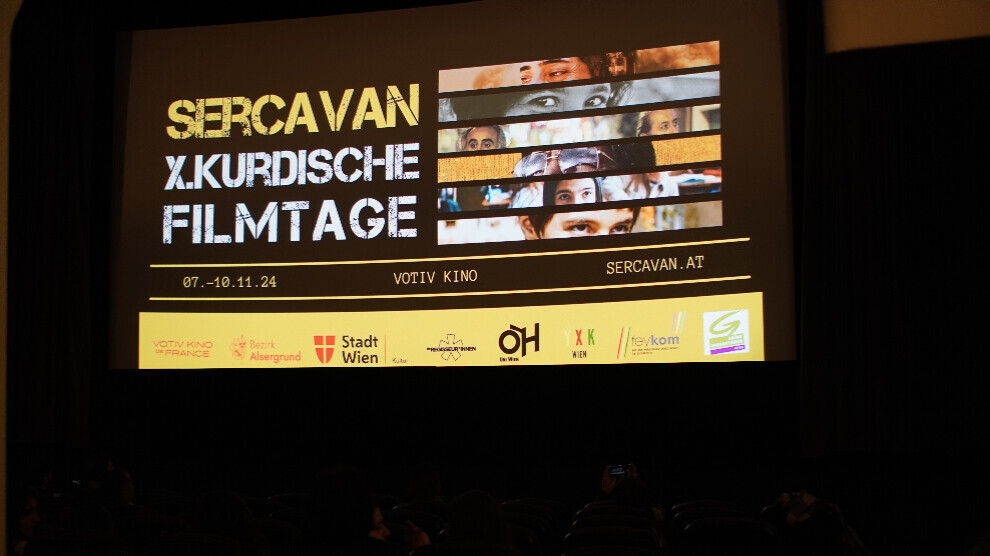10th Kurdish Film Days “Serçavan” continues in Vienna
The 10th Kurdish Film Days “Serçavan” in Vienna started on Thursday with the feature film “Rojbash” and will run until 10 November.
The 10th Kurdish Film Days “Serçavan” in Vienna started on Thursday with the feature film “Rojbash” and will run until 10 November.

Fourteen feature, short films and documentaries are in the program of the tenth edition of the Kurdish Film Days “Serçavan”, which offer a deep dive into Kurdish filmmaking and events in Kurdistan in Vienna’s Votivkino.
Curator and moderator Peri Eraslan led the opening evening on Thursday. Further speeches were by patron Saya Ahmad, the district mayor of the 9th district of Vienna, and the Green MP Berivan Aslan. Walter Baier, chairman of the European Left (European Left Party), sat in the audience as guest of honor and a representative of the Council of Kurdish Society in Austria (Feykom) gave a moving welcoming speech. He described the film festival as a journey that brings the history, stories and traditions of the Kurdish people closer to us in a lively way. It is precisely because of the assimilation policy pursued by the nation states of the four-part Kurdistan - Turkey, Iran, Iraq, Syria - that Kurdish voices are rarely heard and the stories of Kurds are often overlooked. This is why it is all the more important to actively fight against oppression and assimilation policies, for example with film festivals, "which offer us the opportunity to meet ourselves on the screen, to understand ourselves and to invite others to share our perspectives." Cinema has the power to build bridges where words are often not enough.
The representative said: "Kurdish films are a living testimony to our culture and identity. They tell of struggles, dreams, hope, but also of everyday joys and challenges in life. These films reflect the collective memory of our people. Here, the pain of loss is just as tangible as the joy of life and efforts for a better future. For us, the Kurdish community in the diaspora, these films are a reminder of who we are and where we come from. They strengthen our sense of belonging and allow us to maintain the connection to our homeland, even when it often seems far away. For many of us, however, these films are also an expression of resistance - against being forgotten, against the suppression of our identity and language. Through the collective experience of these films, we want to underline above all what we have in common: the need for freedom, justice, a life of peace, security and dignity. In this sense, our stories are not just Kurdish - they are stories of all oppressed societies."
Many of the films shown at the film festival are award-winning and are celebrating their premiere in Austria. The genres include drama, adventure and comedy and offer a multifaceted journey into the diverse life and stories of the Middle East.
Among the films are "Berbû" by director Sevinaz Evdikê, produced by the Rojava Film Commune, which is about changes in the lives of women after the occupation of their homeland by Turkey, and "Sieger sein" by Soleen Yusef, which tells the story of an eleven-year-old girl who fled from Rojava to Berlin and won this year's German Film Prize for Best Children's Film.
The full program of the film days can be found at https://www.votivkino.at/festival/sercavan-kurdische-filmtage/ and https://www.sercavan.at/
The Kurdish Film Days Serçavan, founded in 1999, opened with "Rojbash" ("Good Morning") by director Özkan Küçük. The feature film tells the story of a group of Kurdish theater actors who want to re-stage a play they performed 25 years ago. Despite the time that has passed, they feel confronted with the challenges of Kurdish identity and face numerous obstacles. In addition to internal conflicts, they face the problem of relating the play to the present while the existing stages are sealed. The film focuses on the actors' determination to continue rehearsing despite all adversities, and the performance is presented as a form of resistance. They portray themselves, which gives the film a semi-documentary touch.
Two of the actors of "Rojbash", Nihat Öz and Yıldız Gültekin, were at the opening and answered questions. They also paid tribute to the Istanbul-based Mesopotamia Cultural Center (MKM). They are part of the centre’s theatre section. The MKM was the institution that led the way in the field of culture and art. When the KMM, co-founded by the lmurdered writer Musa Anter, began its work in 1991, there was no Kurdish theater. As in the performing arts, the cultural center also made valuable contributions in the fields of music, dance, film and literature against the assimilation and ignorance to which Kurdish culture is exposed, especially in Turkey.
Today, Saturday, is dedicated to the Kurdish women's movement. The documentary "Jinwar" portrays the village of the same name in the autonomous region of Northern and Eastern Syria, where a matriarchal utopia is being tried out. The short documentary "GotûbêJin" discusses the portrayal of women in Kurdish cinema with the audience of a traveling cinema. And "Lêgerîn - The intensive journey of Alina Sanchez" tells the story of a young Argentinian doctor who travels from Patagonia via Córdoba to Cuba to study social medicine. Her journey takes her through Europe to the Kurdish Rojava in Syria. Alina becomes the Lêgerîn and symbolizes a revolution led by women that connects different realities. The film follows Alina and documents her attempt to recapture the spirit of those women who called for justice in solidarity with their peoples and the struggles of others. It shows the connections between the Latin American and Kurdish struggles and strives to bridge distances and share common experiences.